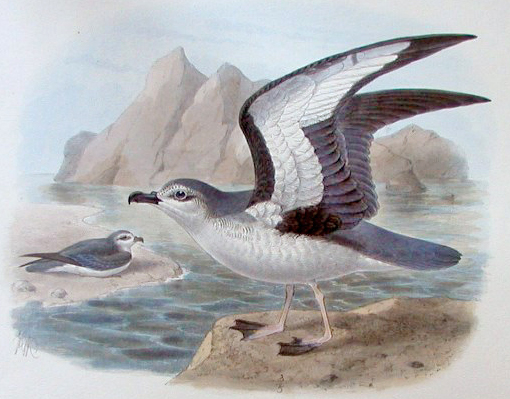|
| Query: black rat | Result: 75th of 161 | |
Chatham Petrel (Pterodroma axillaris) - Wiki
| Subject: | Chatham Petrel (Pterodroma axillaris) - Wiki
| |

| Resolution: 510x399
File Size: 189068 Bytes
Date: 0000:00:00 00:00:00
Camera: C4040Z (OLYMPUS OPTICAL CO.,LTD)
F number: f/1.8
Exposure: 10/400 sec
Focal Length: 73/10
Upload Date: 2007:12:13 15:36:36
|
Chatham Petrel
From Wikipedia, the free encyclopedia
Order: Procellariiformes
Family: Procellariidae
[Photo] Ranguru or Chatham Petrel (Pterodroma axillaris). Date: 1907-1910. Author: Godman, Frederick du Cane, Monograph of the Petrels, 1907-1910. Source: Source New Zealand Antique Prints (www.newzealandantiqueprints.co.nz/gallery/birds/godmanchathamlg.html).
The Chatham Petrel (Pterodroma axillaris) or ranguru (Maori) is a medium-sized, grey, white and black gadfly petrel. The head, back and upper-wings are slate grey, while the shoulders and upper-wing coverts are a deeper grey giving a dark M pattern aacross the spread upper wings. the forehead is mottled grey and white, and the underparts are white. The under-wing is white except for dark outer tips to the primaries, and a narrow dark trailing edge. A black diagional band runs from the bend of the wing to the body at the base of the underwing (which distinguishes it from the similar Black-winged Petrel with the latter having a narrower band not extending as far as the body).
Chatham Petrels nest in burrows under the forest canopy to which they are generally faithful to over time. Leaves are used as nesting material. Each pair lays a single white egg in December-January and the chicks fledge in May-June.
Status and threats
The Chatham Petrel is endemic to the Chatham Islands, New Zealand and until recently was restricted to the 218 ha Rangatira or South-East Island. The population is estimated at 1000 birds and is classified as Nationally Endangered. Once present throughout the Chatham group before the arrival of man, predation by man and introduced mammals (rats and cats) and the loss of forest habitat saw the species restricted to Rangatira island. Before conservation efforts began the size of the Rangatira population was limited by burrow competition with the broad-billed prion Pachyptila vittata, of which an estimated 330,000 pairs inhabit the island.
Conservation
Conservation efforts for the Chatham petrel started in the late 1980's, the initial focus of which was locating burrows and determining the cause of breeding failure. Once it was determined that burrow competition from broad-billed prions was causing most breeding attemptes to fail, attention shifted to protection of burrows and cg=hicks from prion interference. Burrows are located using telemetry - adult birds caught on the surface are fitted with a small transmitter and tracked to their burrows. Burrows are then protected by installing a plastic or wooden artificial burrow (to guard against collapse) and protected from prion entry by the fitting of a neoprene flap over the burrow entrance. Burrows are also blocked over the non-breeding period to ensure they are not occupied by prions during the petrels winter absence. In the 2005/06 breeding season of the 155 known breeding pairs on Rangatira, 83% were successful in fledging their chick.
The transfer of 200 chicks to a predator-proof fenced area on nearby Pitt Island/Rangiauria over the four years 2002-5 has seen the return of small number of birds to the site and the first breeding occur (with the fledging of 1 chick) in the 2005/6 season and four breeding pairs in 2006/7. Plans are now in place to transfer 200 chicks over three years to another predator-proof fenced site on the South coast of Chatham Island.
http://en.wikipedia.org/wiki/Chatham_Petrel
| The text in this page is based on the copyrighted Wikipedia article shown in above URL. It is used under the GNU Free Documentation License. You may redistribute it, verbatim or modified, providing that you comply with the terms of the GFDL. |
|
^o^
Animal Pictures Archive for smart phones
^o^
|
|

